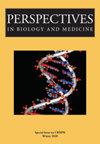威廉·奥斯勒的传统:一种新的精神病学生物人文主义模式
IF 0.7
4区 医学
Q2 HISTORY & PHILOSOPHY OF SCIENCE
引用次数: 0
摘要
威廉·奥斯勒(William Osler, 1849-1919)通常被认为是科学医学出现过程中最有影响力的医生。然而,他的临床医学方法往往被误解,其与精神病学的相关性尚未被系统地探讨。奥斯勒对待病人的方法有四个组成部分:关于疾病的生物还原论、临床诊断的科学方法、治疗的保守主义和对待人的人文主义方法。这些概念与当代精神病学的实用主义、折衷主义、反简化主义的假设相冲突,正如其对“生物心理社会”模型的解释所编纂的那样。这种模式导致不科学的做法,过度使用针对症状的药物,忽视疾病的识别和治疗。本文认为,在精神病学中实施奥斯勒的医学哲学将大大有利于后者。它将开创一种新的精神病学“生物人文主义”方法。本文章由计算机程序翻译,如有差异,请以英文原文为准。
In the Tradition of William Osler: A New Biohumanistic Model of Psychiatry
abstract: William Osler (1849–1919) is often considered the most influential physician in the emergence of science-based medicine. However, his approach to clinical medicine tends to be misunderstood, and its relevance to psychiatry has not been explored systematically. Osler's approach to the patient had four components: biological reductionism about disease, a scientific approach to clinical diagnosis, therapeutic conservatism, and a humanistic approach to the person. These concepts conflict with the pragmatic, eclectic, anti-reductionistic assumptions of contemporary psychiatry, as codified in its interpretation of a "biopsychosocial" model. This model leads to unscientific practice, with excessive use of medications given for symptoms, and inattention to identifying and treating diseases. This article suggests that implementing Osler's philosophy of medicine in psychiatry would greatly benefit the latter. It would inaugurate a new "biohumanistic" approach to psychiatry.
求助全文
通过发布文献求助,成功后即可免费获取论文全文。
去求助
来源期刊

Perspectives in Biology and Medicine
医学-科学史与科学哲学
CiteScore
1.40
自引率
20.00%
发文量
42
审稿时长
>12 weeks
期刊介绍:
Perspectives in Biology and Medicine, an interdisciplinary scholarly journal whose readers include biologists, physicians, students, and scholars, publishes essays that place important biological or medical subjects in broader scientific, social, or humanistic contexts. These essays span a wide range of subjects, from biomedical topics such as neurobiology, genetics, and evolution, to topics in ethics, history, philosophy, and medical education and practice. The editors encourage an informal style that has literary merit and that preserves the warmth, excitement, and color of the biological and medical sciences.
 求助内容:
求助内容: 应助结果提醒方式:
应助结果提醒方式:


